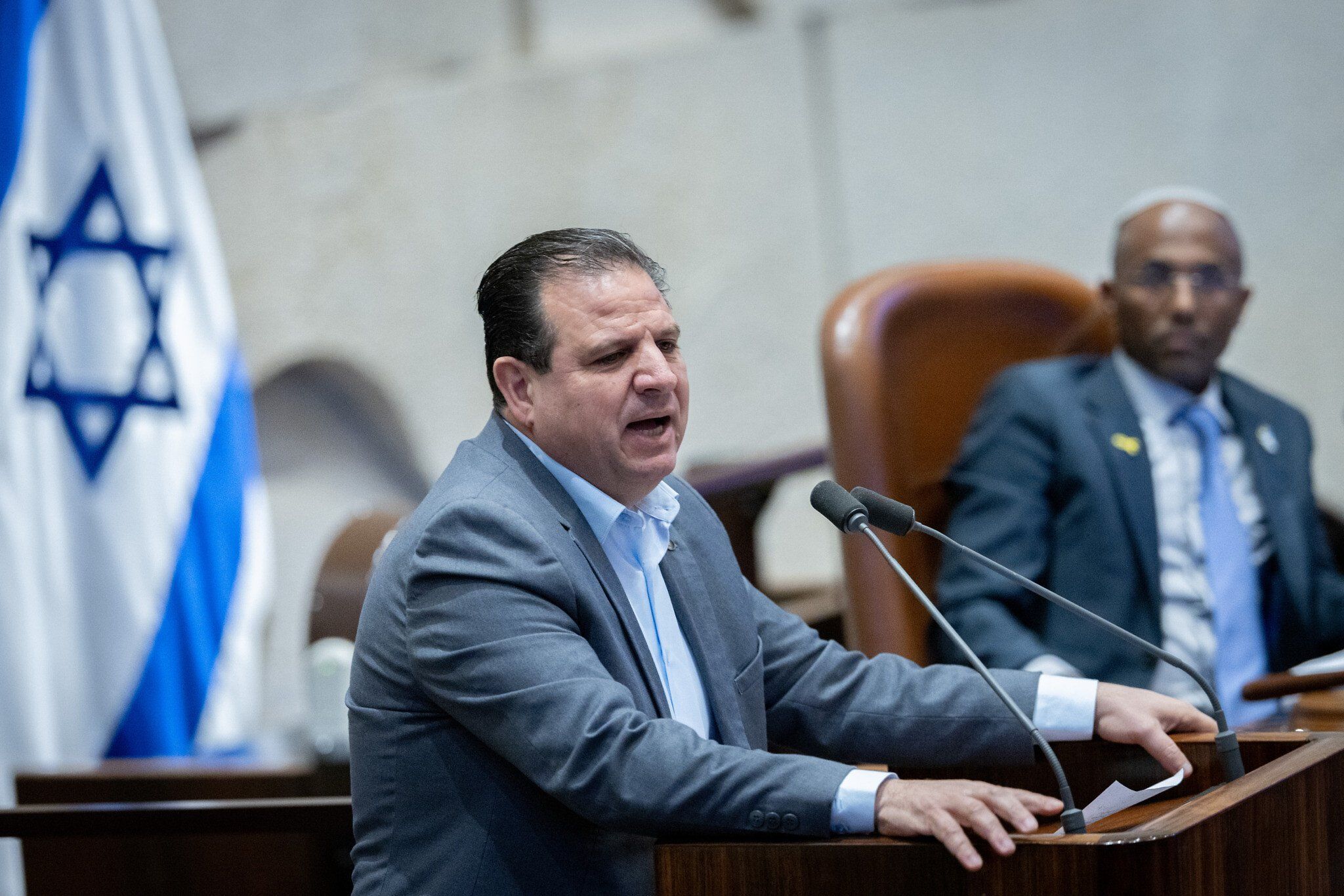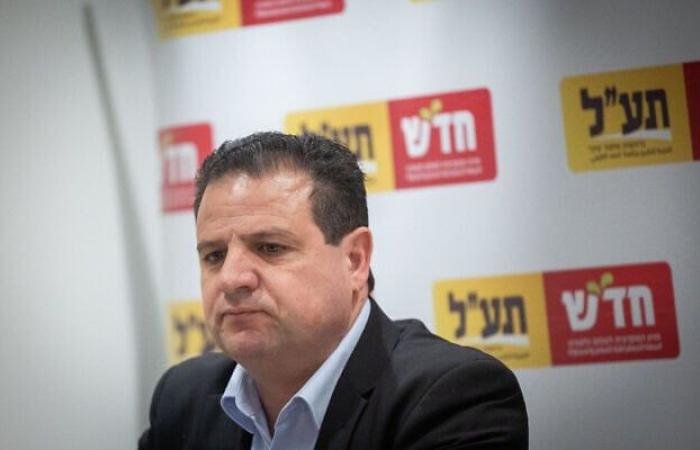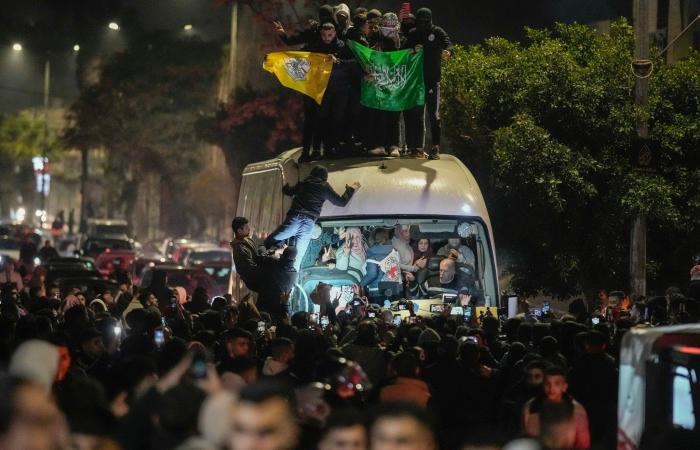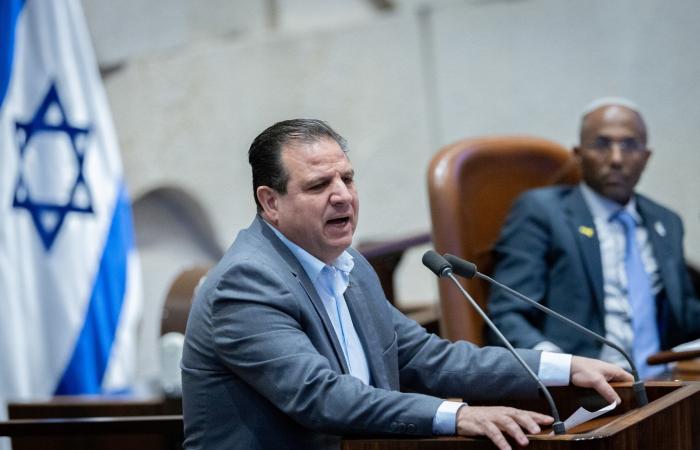The president of the radical Hadash-Taal party, Ayman Odeh, defended himself Tuesday against a wave of negative reactions from MPs across the political spectrum, after declaring that he was “happy about the release hostages and prisoners” as part of a ceasefire agreement between Israel and Hamas in the Gaza Strip.
The longtime leader of the country’s top Arab politician made the comments on A few hours later, and in accordance with the terms of the agreement, 90 Palestinian prisoners were released by Israel in the West Bank and East Jerusalem.
The first phase of the three-phase ceasefire agreement calls for the release of 33 Israeli hostages over a 42-day period in exchange for nearly 2,000 Palestinian prisoners, including many serving life sentences for terrorist attacks and deadly attacks.
To not miss any of the news,
receive the Daily Headline on your email
By registering, you agree to the terms of use
“We must now free both peoples from the yoke of occupation,” Odeh wrote at the time. “We are all born free. »
Ayman Odeh, who belongs to the far-left Hadash faction, returned to of Israel’s Arab minority.
“I understand that many people were hurt by my comments,” he began. “I realized that, unfortunately, the families of the hostages, with whom I am in close contact and whom I supported throughout their fight, were also injured, and this sincerely saddens me. »
“My perspective as a Palestinian citizen of Israel probably differs from that of many Jewish citizens of Israel. While it is clear that many of you tend to see primarily the suffering of the Jews, I see and feel the suffering of both peoples,” Odeh assured. “This is simply the reality, not just mine, but that of all Arabs living in this country. »
He stressed that he too had been moved “when the kidnapped women, innocent of any crime, returned to the arms of their mothers”, but that he had been equally moved by the release of the 90 Palestinian prisoners later on Sunday evening.
The freed hostages (from left): Doron Steinbrecher, Emily Damari and Romi Gonen reuniting with their mothers shortly after returning to Israel after 471 days of captivity in Hamas jails in Gaza, January 19, 2025. (Credit: Israeli Army )
Calling them “minors, teenagers,” Odeh said “most of the prisoners released that day were not charged with anything at all” as many of them were placed in administrative detention – a controversial move allowing indefinite detention without charge that Israel uses against terrorism suspects, almost exclusively Palestinians, in cases where disclosure of evidence against them in court could harm national security.
The Israeli Prison Service has not provided complete data on released prisoners, but conflicting media reports have indicated that Israel released between 62 and 69 women – including one minor – and between 13 and 28 men, as well as eight adolescents.
While none of those released were charged with murder, several were behind terrorist attacks that did not result in any deaths, including 15-year-old Mahmoud Aliowat, who was the youngest prisoner released Monday. Aliowat was convicted of carrying out a shooting in Jerusalem’s City of David neighborhood, injuring two people, when he was 13 years old.
The list also includes Khalida Jarrar, 62, an influential member of the Popular Front for the Liberation of Palestine (PFLP), a terrorist group that has carried out attacks against Israel for decades, including plane hijackings.
Jarrar was accused of organizing a 2019 bombing that killed 17-year-old Rina Shnerb at a spring in the West Bank. She was sentenced to two years in prison in 2021 as part of a plea deal, and was rearrested in late 2023 and placed in administrative detention until her release.
-The adult men released on Sunday were all detained for relatively minor offenses such as inciting or identifying with terrorism and disturbing public order, according to Ynet.
A crowd gathers around a bus carrying released Palestinian security prisoners as it arrives in the West Bank town of Beitunia, January 20, 2025. (AP Photo/Leo Correa)
“Although my words may be difficult for some, I am a citizen of Israel who sees and feels the suffering of the Palestinian people, the suffering of my people who live under occupation,” said Ayman Odeh, clarifying that this does not did not prevent him from “feeling the pain” of Jewish Israelis, “even if, as things currently stand, the occupation is being carried out in their name.”
Going so far as to quote the writer Leo Tolstoy, Odeh added: “If you feel pain, you are alive. If you feel the pain of others, you are a human being.”
“I am a person who feels your pain, and I also live and feel the pain of my people,” concluded the Hadash-Taal president. “Don’t succumb to the tide of incitement and distortion. »
Following his initial remarks on Sunday, Odeh faced calls from right-wing and centrist parties to exclude him from the Knesset, and far-right Otzma Yehudit MK Yitzhak Wasserlauf said he would raise signatures to oust him.

Hadash party leader Ayman Odeh speaking during a plenary session at the Knesset in Jerusalem on December 18, 2024. (Chaïm Goldberg/Flash90)
Odeh is no stranger (at all) to verbal altercations with his Knesset colleagues.
Last month, Otzma Yehudit lawmakers called for Odeh to be sanctioned after he appeared to justify some of Hamas’ actions on October 7, 2023, when thousands of terrorists stormed into Israel by land, air and sea , killing some 1,200 people and taking 251 hostages, most of them civilians.
“Kidnapping a one-year-old baby, an 88-year-old woman, murdering people who are dancing, it is above all a very, very, very profound moral violation. At the same time, I believe that every people in struggle has the right to fight the occupier, I am convinced of that,” said the radical Arab MP during a debate in the Knesset in December.
In July, Odeh was excluded from a Knesset plenary session after calling Prime Minister Benjamin Netanyahu the “biggest terrorist here” while addressing the Knesset.
The MP announced in May 2023 that he did not plan to run in the next election.
As head of Hadash, an Arab party with communist ties, Odeh led the joint list of his faction and three other Arab parties from its creation in 2015 until its dissolution in 2022, taking Arab politics to new levels almost unprecedented representation in the Knesset.
However, it has struggled to translate gains at the ballot box into political influence, with Arab parties often shunned by mainstream Jewish Israeli politicians, and Arab MPs themselves often opposed to cooperating with the coalition and l ‘opposition.








